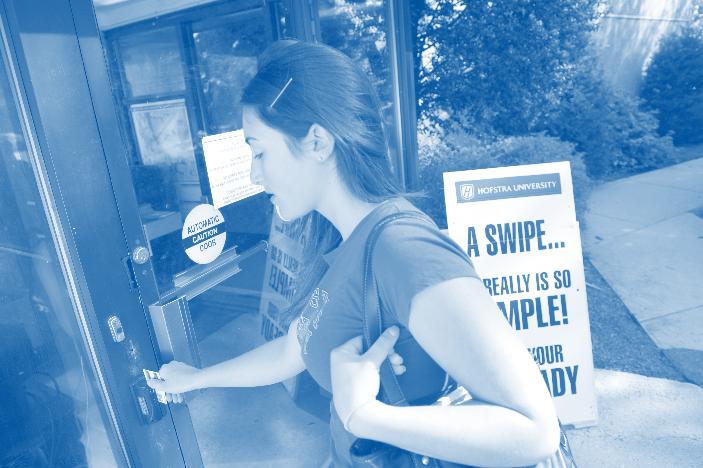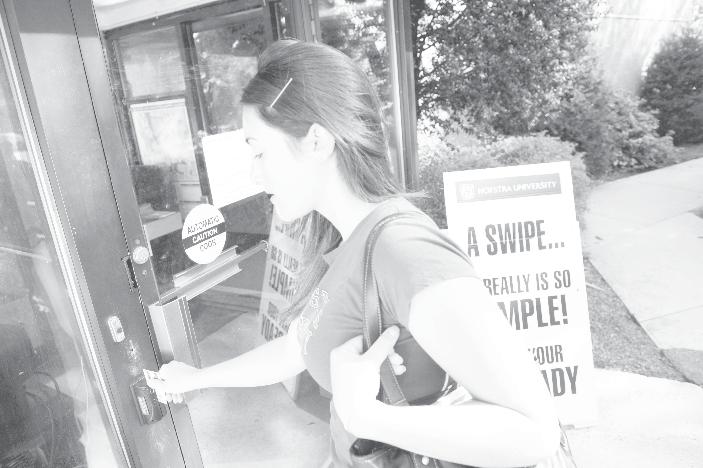
9 minute read
Fire Safety Guidelines
Your safety matters most to us. Each Hofstra University residence hall is equipped with an interior fire alarm system with detection capability throughout the building, including smoke detectors, heat detectors, and pull-box stations. All residence halls are protected by a sprinkler system and by carbon monoxide detectors. All fire safety and building access systems are monitored by the Department of Public Safety, 24 hours a day, 365 days a year. Additional information about fire safety on campus is available in the Annual Security and Fire Safety Report, which can be accessed at hofstra.edu/ campussafetyreport or by calling Public Safety at 516-463-6606. Hofstra University policies relating to fire safety are in accordance with New York state law, Nassau County ordinances, and the International Fire Code (IFC). The IFC establishes the requirements for fire prevention and fire protection systems. These requirements are enforced by our standards and by the New York State Office of Fire Prevention and Control. Our primary concern is the safety and well-being of the members of our community, and, as such, new policies have been created and existing policies have been modified to ensure that Hofstra University provides a safe environment and is in compliance with all New York State Fire Codes and those of the Nassau County Fire Marshal’s Office. Students must comply with the specific policies listed below as well as all other policies listed in The Living Factor: Student Calendar and Guide to Residence Life Policies and Procedures. In addition, as per the International Fire Code, information and training related to fire safety are presented on an annual basis to all students enrolled in higher education. Any violation of these guidelines is also considered a violation of the Student Code of Conduct.
1. Door Chocking (Propping): A door leading out to a main hallway (common area), used as fire and/or smoke door, should not be chocked (propped) open, blocked, or obstructed to prevent the normal self-closing operation of said door. [ref; IFC F-703.2] 2. Electric Wall Outlets: All electric cords from devices must be plugged directly into a wall outlet or an approved surge protector strip. All surge protector strips must be plugged directly into the wall outlet. All appliances must be plugged directly into a wall outlet. Extension cords that are not grounded AND do not have a light indicator AND an on/off switch are not permitted in the residence halls. Furniture should not obstruct a wall outlet as to prevent an electrical plug from easily being removed from the outlet (without first moving the furniture). [ref; IFC F-605.5] 3. Items Suspended from Ceilings and Walls: No items shall be suspended from the ceiling or within 24” of the ceiling as to obstruct or cover lighting, smoke detectors, and/or sprinkler heads. [ref; IFC-901.6 and 805.1 and 315.2.1] No decorative, holiday, or themed lighting shall be placed/hung on or around doors or windows. 4. Decorations: No tapestries or fabric items, including flags (unless flame-retardant is noted on the product), shall be placed on the ceilings or walls of any room. Wall coverings may include pictures and posters, but may not exceed 50 percent of total wall space. Tapestries and/or fabric items (including doormats) shall not be placed in common areas. [ref; IFC304.1] No window curtains or valances are permitted to be hung in rooms/suites/apartments. 5. Natural Cut Trees: No natural cut trees of any sort shall be erected in the common or living space of any residence hall [ref; IFC 804.1.1] 6. Candles/Incense: No candles (including those used for “decoration only”), incense, or anything that burns are permitted in residence halls. 7. Smoking: Hofstra University is a smoke-free environment. There is no smoking or lighting of smoking-type products, including e-cigarettes, vaporizers, and hookahs, in any residence hall/room or facility on the Hofstra University campus. For more information about Hofstra’s smoke-free policy, please visit hofstra.edu/smoking. 8. Malicious Damage/False Alarms: The alteration and/or destruction of fire safety equipment affects the safety of all members of the Hofstra community. Malicious damage to any fire safety equipment, including fire extinguishers, exit signs, fire doors, and emergency lighting, and/or the activation of a fire pull station when the threat of fire is not present, is a crime and is not tolerated at Hofstra University. Violators will be prosecuted to the fullest extent of the law. 9. Refrigerator/Microwave: *Residents may bring their own refrigerator for their residence hall room or suite. The size and number of these refrigerators are limited (one per traditional room and two per suite) due to the electrical current they draw and the limited electrical outlets in the residence hall rooms and suites. (All appliances must be plugged directly into a wall outlet.) The refrigerator must be an energy-efficient model and may not exceed 5 cubic feet in size. Any refrigerator larger than 5 cubic feet in a residence hall room and/or suite is a violation of Residence Life policy. Additionally, personal microwaves are prohibited in on-campus residence hall rooms and suites. The University has made arrangements with a vendor to provide both refrigerator and refrigerator/microwave rental units at competitive prices. (Visit the Residence Life website for vendor contact information.) Although students can purchase refrigerator/freezer units of 5.0 cubic feet or less for use in residential rooms, for safety reasons, only those refrigerator/freezer/microwave multi-units rented through a University-sanctioned vendor are permitted in on-campus residence halls. Refrigerators must be plugged directly into the wall electrical socket and not a surge protector. Stand-alone freezers of any size are not permitted in the residence halls.
Advertisement
*Personal microwaves and refrigerators, including the refrigerator/freezer/microwave multi-units rented through the University-sanctioned vendor, are prohibited in the Graduate Residence Hall rooms and suites.
10. Electrical Appliances Policy: Due to safety issues, the following items are prohibited in the residence halls: hot plates; hot pots; slow cookers; electric teakettles; electric grills and electric skillets; toaster ovens; toasters; hot oil popcorn poppers; microwaves; deep fryers; refrigerators larger than 5 cubic feet; humidifiers; dehumidifiers; self-balancing scooters, handsfree personal transporters, battery-operated scooters, electric-powered skateboards, similar devices, and their chargers; multiple outlets; extension cords and multiplugs that are not grounded and do not have a light indicator AND and on/off switch; halogen lights; sun lamps; multi-plug lamps; lamps with an outlet; rock salt lamps and plug-in rock salt night lights; lava lamps; scented and unscented plug-in air fresheners (unless UL-approved), air purifiers (unless it is Medify Air MA-14 Air Purifier), and diffusers; electric heaters; electric blankets; and any other appliances deemed by the Office of Residence Life as being inappropriate for residence hall use. One-cup coffee makers (one per bedroom) are permitted if they are UL-approved, equipped with auto shutoff, and used in accordance with the manufacturer’s guidelines All permissible appliances must be plugged directly into a wall outlet. Additionally, black light bulbs in University light fixtures are prohibited. Residents of the Graduate Residence Hall are permitted to have one (1) of each of the following per suite:
coffee maker, toaster (NOT toaster oven), electric teakettle, and rice cooker (if used ONLY in cooking areas).
11. Cooking Policy: Cooking in student rooms is allowed where kitchen facilities are a standard part of the room’s facilities and in community cooking locations. Various food and beverage vending machines are located in the lobbies or lounges of the residence halls. For refunds for vending machine purchases, follow the instructions posted on the front of the vending machines. Report malfunctioning kitchen appliances or vending machines to the resident assistant. Stoves for student use are located in each lounge; please use them safely. Barbecues are prohibited but can be contracted from Dining Services for student groups/gatherings. There is a $100 fine, per appliance, for possession of prohibited cooking and/or electrical appliances in the residence halls. Any additional violation of this policy is grounds for further disciplinary action and/or fines. All students must comply fully with all Hofstra University fire safety regulations. Violations may result in monetary, educational, and/or conduct sanctions.

Evacuation/Fire Alarm Procedures
Evacuation is necessary when any building’s fire alarm has been activated or the building becomes uninhabitable because of an event such as a fire, flood, gas leak, contamination, pandemic flu, extreme weather conditions, or the loss of critical services. The response depends on the level and extent of the emergency. Hofstra community members should familiarize themselves with the evacuation routes posted in the buildings they live in or use frequently. If an evacuation order is issued for a building, cooperate fully with Public Safety/emergency personnel and: • Don’t panic. Stay calm. • If possible, take keys, wallets, and essential belongings with you. • If possible, wear weather-appropriate clothing. • If your door feels hot, place a wet towel under it and DO NOT OPEN IT. Instead, open your window slightly, if you need air. While you await rescue, call Public Safety at 516-463-6789 or 911 to ascertain that they know your location.
Make your presence known by waving something from your window. • If the hallway is filled with smoke, crouch down as low as possible (smoke rises) and hug the wall. Walls eventually lead to an egress. • DO NOT USE ELEVATORS. USE ONLY STAIRS; elevators turn into chimneys when there is a fire and may malfunction due to heat/smoke. • Close, but DO NOT LOCK DOORS. • Provide assistance to those with physical disabilities. • Evacuate in a safe and orderly fashion to the nearest evacuation assembly point (as determined by University personnel) and await additional instructions. • Move away from the building. Do not return to the building until instructed to do so by Public Safety. General Evacuation Procedures: Public Safety officers will move evacuees to an evacuation assembly point where University personnel will conduct a census to establish that the evacuation is complete. (Each building has been assigned an evacuation assembly point; check with your RA for your building’s assembly point.) Evacuation of Individuals with Physical Disabilities: Public Safety officers will assist individuals with physical disabilities in an evacuation, making every attempt to lead them to safety. Hearing-impaired students who require TTY phone capability and strobe lights connected to the fire alarm system in their residence hall rooms should contact Student Access Services at 516-463-7075 or sas@hofstra.edu. If you have a disability that could impair your ability to perform any of the above: Please inform Public Safety or Student Access Services of your circumstances upon arrival to campus and request a meeting to discuss any special emergency response accommodations needed. Please note that a master list of all residential students requiring assistance during a building evacuation is maintained by Student Access Services. Please contact Student Access Services to ensure inclusion on this list. Any student may: • Call the Department of Public Safety at 516-463-6789 or call 911 and tell them where the student is located and what assistance is needed. • Notify their professors that assistance will be needed if an evacuation of any academic building is deemed necessary.




